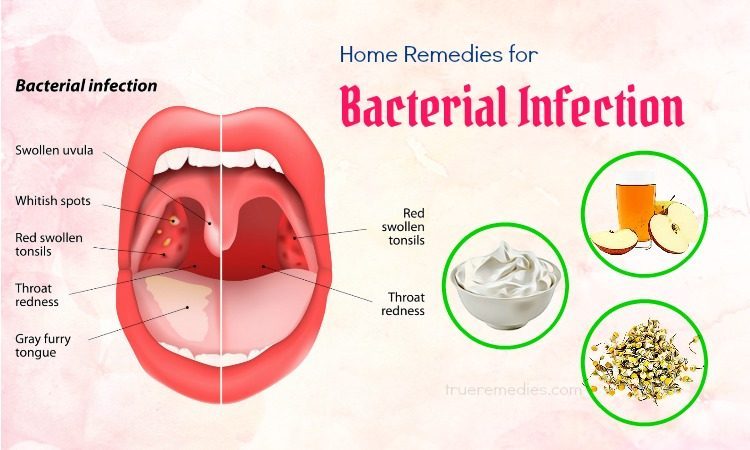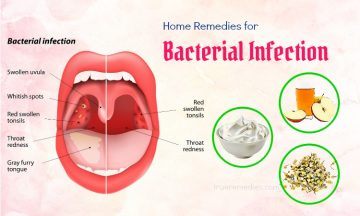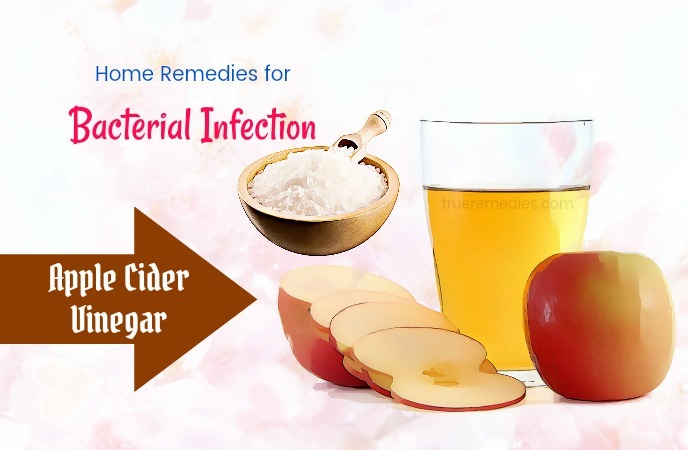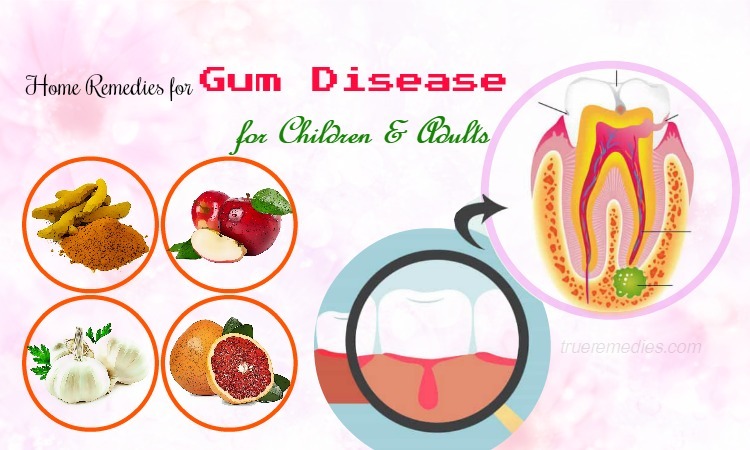Updated: 09/11/2019
Contents
As you may know, bacteria are tiny living things that have only one cell. We may find their appearance in every climate and everywhere on our planet, for example in the air, in water, in soil or even inside plants, animals and people. The vast majority of bacteria are harmless to humans whereas some of them are not and may result in many serious illnesses such as blood poisoning (bacteremia), kidney failure, toxic shock syndrome, etc.
As a matter of fact, bacterial infection is one of the most troublesome health issues that people are struggling with today. It may affect your skin, bowel, lungs, mouth, throat and many other parts of your body. Actually, there are many over the counter medications to combat bacterial infection in throat and mouth. But if you are looking for natural ways to protect you from bacterial infection, then you may want to turn to home remedies for bacterial infection.
This article of 10 Natural Home Remedies For Bacterial Infection In Throat And Mouth is suitable with people who are looking for the home-remedy route of how to stop bacterial infection naturally.
There is no science-based evidence for the following homemade recipes. The recipes we've focused on are traditional home remedies, so always consult your doctor and check out your health condition regularly.
- Top 22 natural treatments for staph infection
- Top 37 tips to treat bacterial infection without antibiotics
- Top 28 time-tested solutions for bacterial vaginosis symptoms
TrueRemedies Partner Solutions

Need a Help from the Leading Expert Online, Available 24/7?
They’re all here and ready to answer your questions online or by phone. Keep asking questions until you get the answer you need.
1. Yogurt
Yogurt is the second easy and cheap option to remove bacterial infection in throat and mouth. The probiotics in yogurt help balance the pH level and minimize the growth of harmful bacteria, thereby giving your body the power and better immunity to fight against bacterial infection[1]. All you have to do is:
- Choose raw milk.
- Use a pan to heat the milk with medium heat.
- Wait for the hot milk to become cool down to 115 degrees.
- Add 2 tablespoons of pre-made yogurt to each quart of milk and stir gently.
- Use a strainer to strain this mixture and pour it into cups.
- Use an oven (with the lids on) to incubate the yogurt for at least 10 to 12 hours or overnight.
- Take out the incubated yogurt.
- Put the yogurt in the fridge for at least two hours.
- Eat two cups of plain yogurt daily.
Note: You may add sugar in yogurt if you don’t like the taste of plain yogurt.
2. Turmeric
Turmeric, sometimes called Curcuma longa, is an herbal perennial plant with a large aromatic yellow rhizome that belongs to the ginger family. The bright yellow powder obtained from the turmeric’s rhizome is well known for its usage in flavoring, coloring for culinary purposes, and treating for many diseases.
Curcumin in turmeric has high contents of antioxidant, anti-bacterial and anti-inflammation microbes[2]. Therefore, it has been used as a preventive method for many bacterial infections of the body, including infections in throat and mouth.
- Take some fresh turmeric rhizomes and wash carefully with water.
- Put them in a pan and boil them for around 45 minutes.
- Drying the boiled turmeric rhizomes under the sun or baking them with microwave oven.
- Grind all the turmeric rhizomes thoroughly.
- Pass the ground turmeric through a strainer to get the turmeric powder.
- Pour all the powder in a box and keep in a dry place.
- Directly eat a tablespoon of turmeric powder every day.
Or, you may also drink turmeric powder mixed with warm water / milk to get similar effects.
3. Sage
Sage is a perennial herb with aromatic blue, pink or white flowers. It is grown on semi-cone shaped stalks and has been used medicinally for a long time. Surprisingly, it acts as an astringent to make the tissues contract and then cut down swelling. Besides, phenolic acids in sage are said to be able to repel bad germs. Thus, sage offers additional health benefits to treat bacterial infection in throat and mouth[3]. Don’t be indecisive if you wish to try the efficacy of this natural relief. What you need to do is:
- Boil one cup of water.
- Add 2 teaspoons of sage leaves (dried or fresh).
- Steep for 20 minutes.
- Strain to get sage tea.
- Dissolve a handful of salt in the tea.
- Use this tea to gargle several times a day.
4. Baking Soda
Baking soda is an excellent suggestion among home remedies for bacterial infection in throat and mouth. The National Cancer Institute recommended using the combination of warm water, salt and baking soda to gargle or gently swish may make harmful germs vanish. The alkaline pH level in baking soda effectively aids in soothing minor irritations and swollen tissues in your throat and mouth. Moreover, it has an antibacterial property that helps stimulate the immune system to fight infection in your infected areas[4]. Let’s see how to rape its benefits as below:
Ingredients:
- 1 cup of warm water.
- ½ teaspoon of salt.
- ½ teaspoon of baking soda.
Process:
- Add ½ teaspoon of salt and ½ teaspoon of baking soda in 1 cup of warm water.
- Stir them well.
- Use this mixture to gargle.
- Perform this twice in a row.
- Repeat three times per day.
5. Apple Cider Vinegar
Apple cider vinegar is the first and foremost homemade method for bacterial infection in throat and mouth. It is easy to find apple cider vinegar in many kitchens. Normally, it has been used for culinary purposes for centuries. But this vinegar shows great benefits in curing many diseases including rashes, digestive problems, acne, urinary tract infections, sinus infections and even bacterial infection in throat and mouth, too. A study from the University of North Carolina strongly suggested apple cider vinegar for curing bacterial infection. Furthermore, according to Medscape General Medicine, it has been shown in the laboratory that apple cider vinegar may cut down the amount of bacteria on food. Actually, the anti-bacterial and anti-inflammatory properties of apple cider vinegar may help balance the pH level and protect you from bacterial sustaining in affected areas[5]. With these advantageous benefits, apple cider vinegar should be naturally discouraged to treat bacterial infection in throat and mouth.
What you need to do is:
- Prepare one tablespoon of apple cider vinegar.
- Dissolve this vinegar to a cup of water.
- Add a dash of salt (optional)
- Drink this concoction slowly.
Note: Apple cider vinegar may not be used as a substitute for antibiotics.
6. Chamomile
Chamomile, a member of the Asteraceae family, has been used as a favorite beverage since ancient times. It is related to a wide range of different daisy-like plants. There are many species of chamomile but the most common ones are Chamaemelum nobile (Roman chamomile) and Matricaria recutita (German chamomile).
Over the past 20 years, extensive scientific research has confirmed many traditional uses of this plant in teas as well as its pharmacological features including antipyretic, antiseptic, antispasmodic, antifungal, anti-inflammatory, sedative, muscle relaxant, anti-allergenic and antibacterial activity[6].
Nowadays, chamomile is used as a pharmacopoeia drug in 26 countries. Thus, there is no doubt that all of these beneficial properties of chamomile may aid in discouraging bacterial growth and stop symptoms of bacterial infection in throat and mouth. Let’s see how this herb works effectively as follows:
Method 1: Chamomile tea
- Put 2 to 3 teaspoons of dried chamomile flowers into a cup of boiling water.
- Leave it for three minutes.
- Use a tea strainer to get chamomile tea.
- Add a slice of lemon juice or some honey (optional).
- Sip it slowly.
Method 2: Chamomile steaming
- Add some dried chamomile flowers into a pot.
- Heat until it boils.
- Turn down the heat to small.
- Inhale the vapors deeply a few times.
- Repeat twice a week for best results.
Note: Do not use chamomile for pregnant or breastfeeding women and people who has ragweed allergies.
7. Clove
Clove, also called Eugenia caryophyllata, is the aromatic dried flower bud of a tropical evergreen tree of the myrtle family that is widely grown in Indonesia and Madagascar throughout the year. It has an indigenous pungency and popularly used as a spice in many countries.
Just like many other herbs, clove also offers multiple medicinal benefits such as relieving and preventing cancer, liver problems, headaches and migraines, and giving a boost to the immune system, digestion, diabetes control, bone preservation, etc. According to the National Nutrient Database for Standard Reference, clove is rich in nutrients like carbohydrate, sugars, dietary fiber, protein, lipids, minerals and vitamins such as calcium, hydrochloric acid, magnesium, iron, phosphorous, potassium, vitamin C, vitamin A, vitamin B6 & B12, vitamin E, etc… The Journal of Immunotoxicology identified that the eugenol in clove is indeed a powerful anti-inflammatory and antioxidant or immune modulating agent[7].
How to use:
Method 1: Clove tea
- Cut some fresh cloves from a clove plant.
- Wash them with water.
- Steep them in boiling water for five minutes.
- Drain to get clove water.
- Drink it slowly.
Method 2: Clove and honey mixture
- Mix some fried cloves with honey to make a paste.
- Chew and swallow it.
- Follow the steps one or two times per week.
Note: You may use clove powder instead of fried cloves.
8. Cinnamon
Cinnamon, also called dalchini, is the aromatic peeled, dried and rolled inner bark of the bushy evergreen trees belonging to the genus Cinnamomum of the laurel family. In many countries, it is a popular spice that is used for culinary purposes like baked goods, oatmeal and hot beverages.
More interestingly, cinnamon is also a well-loved cure-all for numerous conditions such as nausea, digestive problems, heart disease, hormonal insulin, blood sugar, diabetes, neurodegenerative disease, bacterial and fungal infections, etc. In fact, cinnamon, along with its special aroma, is loaded with antioxidants and anti-inflammatory which may cut down the production of mucus in your throat, ease the swelling, irritation and pain and kill off harmful bacteria[8].
Follow the steps below:
- Bring a cup of water to boil.
- Add 2 cinnamon sticks to the boiling water.
- Let it simmer for 2 to 3 minutes.
- Leave it steep for 10 minutes.
- Strain to get cinnamon tea.
- Sip this tea slowly or use it as a mouthwash.
- Redo twice per day when needed.
Note:
- You may use cinnamon powder instead of cinnamon sticks.
- Do not use cinnamon for pregnant and breastfeeding women.
9. Garlic
Garlic has an organosulfur compound called allicin and potent immune stimulating effects which are able to fight and heal infections[9]. Additionally, the natural oils in garlic bring decongestant and expectorant properties that may aid in expelling pain and irritation in throat and mouth. Thanks to such an extensive list of potential benefits, it is worth adding this natural antibacterial herb to the home remedies for curing infected throat and mouth.
Let’s have a look at a wide range of natural methods as follows:
Method 2: Garlic tea
- Peel 4 cloves of garlic and wash carefully with water.
- Use a chopping board to mince them finely.
- Leave the minced cloves rest for ten minutes.
- Add them to a cup of boiling water.
- Steep it for at least five minutes.
- Slowly sip the tea.
- Drink 2 to 3 cups per day for better results.
Method 3: Garlic and milk
- Get a cup of lukewarm milk.
- Take some garlic cloves and crush them.
- Mix a tablespoon of crushed garlic cloves to lukewarm milk.
- Stir them well and drink before going to bed.
- Do this once a day.
Method 5: Garlic and olive oil
- Make some extra virgin olive oil warm.
- Add few crushed cloves of garlic to this warm oil.
- Let them steep for 10 minutes.
- Strain the oil and wait for it to become cooler.
- Consume one teaspoon of oil every three hours.
- Perform this process daily.
10. Hydrogen Peroxide
Hydrogen peroxide, abbreviated as H2O2, is the germicidal agent that is composed of water and oxygen. It has mild antiseptic which is used to cure small wounds, burns, cuts and scrapes by releasing oxygen and then cleaning out cuts and prohibiting infections[10]. Additionally, H2O2 is also used as a mouth rinse to clear mucus and release irritation. For its usefulness as a sanitizer, hydrogen peroxide is considered the safest and natural effective home remedies for bacterial infection in throat and mouth.
Method 1: Toothpaste
- Add 1 teaspoons of baking soda into a cap-full of 3% hydrogen peroxide.
- Mix them well to form a paste.
- Use this paste to directly brush your teeth.
- Redo 2 times per day.
Method 2: Use hydrogen peroxide as a mouthwash
- Pour a cap-full of 3% hydrogen peroxide into a cup.
- Dilute the peroxide with one cap-full of warm water.
- Mix them well and gargle this liquid several times a day.
Note: If you may not stand the taste, add a little honey.
Self-Care Infection Preventative Methods
Prevention is always the best way to keep healthy in general than treatment. In order to have a good health, you need to take these following useful directions to stop spreading germs such as bacteria, fungi, viruses and then completely get rid of bacterial infection. Pay attention to these things as below:
- Avoid unpasteurized dairy products.
- Keep food and drink’s temperature moderate.
- Store and cook food properly.
- Avoid irritants.
- Wash your hands properly after contacting with raw foods, dirty diapers, pet feces, reptiles, after using the bathroom, before preparing food and before eating.
- Wash your plates, knives, utensils, cutting boards and food preparation areas in hot soapy water after using it.
- Cleanse fruits and vegetables thoroughly with water before eating.
- Follow the hospital guidelines when dealing with blood or contaminated items.
- Always have tissues and hand cleaners available.
- Stay at home if you are sick.
- Avoid contact with people who have bacterial diseases or symptoms like fever, vomiting or diarrhea. If you may not avoid this, remember to wash your hands thoroughly after meeting them.
- Take enough rest and reduce stress.
- Throw out expired or perishable food.
- Wear long pants and sleeves when in wooded areas.
- Clean surfaces (computer keyboards, sinks, and telephones) with antibacterial products.
- Get recommended vaccines for popular bacterial diseases such as rabies, meningitis, tetanus, and pneumonia.
- Do it right to refrigerate the leftovers. Do not leave them for more than two or three days.
- Enjoy a healthy diet which is high in fruits, vegetables and whole grains.
- Avoid raw or undercooked meat, eggs, seafood and poultry.
- Abstain from sexual contact or use a condom during sexual intercourse.
- Do not smoke and avoid second smoke as well.
Now you are able to treat bacterial infection in throat and mouth by yourself at home with all these above helpful home remedies for bacterial infection. It’s not all of them may work well on you. There are plenty of options to make a choice and you will see what remedy is the most suitable one. Choose one or some of them, you will see how effective they are. Do you know any other exciting ideas for the article “10 Natural Home Remedies For Bacterial Infection In Throat And Mouth” that we have not mentioned?











